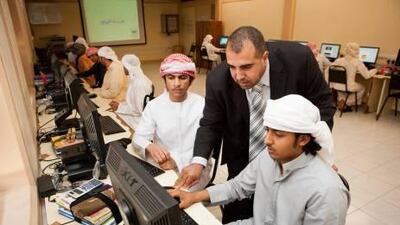RAS AL KHAIMAH // A virtual staffroom set up for teachers in the emirate to share information on projects has helped enhance lessons in public schools.
More than 175 teachers from various schools in the area have begun collaborating with their peers on the Ras al Khaimah Teacher's Network.
The online platform was set up for the teachers who wanted to discuss ways to improve education in the emirate.
Abdeaziz Hasa, a mathematics teacher at the Tumb Secondary School, uses the forum to find out how colleagues at other schools teach similar topics.
"The forums are so famous and we get immediate responses from other teachers who are part of the network," he said.
"We exchange exercises and test papers. The sharing reduces our work and also helps us think of better ways to improve our students' performance."
He recently created an animated presentation to teach trigonometry and noted a renewed interest among pupils.
"Mathematics is tough, but when you make the lessons interactive, they get interested."
Mr Hasa was not always technology-savvy but he said attending a series of IT courses organised by the Sheikh Saud bin Saqr al Qasimi Foundation for Policy Research changed his outlook towards teaching.
The foundation, set up in 2009, designed a scholarship programme to train educators in 21st-century skills after it was found that the "chalk and talk" approach was hampering students' progress.
A hybrid programme was developed two years ago which included face-to-face and online sessions in using social media and creating blogs and podcasts for teaching.
The teachers have gone from relying on books to explain content to creating their own resources with the help of online tools, said Anna Batchelder, founder of Bon Education, which was commissioned to design and run the programmes.
"The teachers are communicating with the students and parents through blogs and have a more practical approach now than before," she said.
When the organisation was asked to step in and boost teacher skills, an initial survey of 150 teachers revealed that they wanted to learn about technology.
"Most of them were familiar with Microsoft, but they wanted to do more in web 2.0 tools: blogs, podcasts and social networks," Ms Batchelder said.
The initiative is not without challenges. Disrupted internet service and a lack of computers can pose difficulties, according to 30 per cent of those surveyed.
Ms Batchelder added: "The biggest challenge is also getting the principals on-board because, if they do not want these changes, it cannot be effectively brought about."
As part of the three-month voluntary programme held twice a year, participants had to complete a project like creating an online newspaper, managing a school radio station or developing an in-house communication network.
Ms Batchelder said using online tools inspired teachers and offered them the chance to work with other schools.
"A blog created by an Islamic teacher has received 10,000 visitors - and that too from other countries in the Middle East," she said.
A research component was added to this year's programme, which was attended by 20 teachers, where they had to identify an issue in the school and use the knowledge gleaned in the sessions to solve it.
The other aim of the programme is to pass on expertise to local staff. Mohamad Ata, a biology teacher at the RAK Public School, took part in the course a year ago and was taken on board as a full-time trainer recently. "Children are using the internet all the time and they know more than us. We cannot be left behind," said the teacher who uses YouTube videos in his lessons.
"We need to move away from our traditional approach and adopt these new tools if we want to be better teachers."
To view the teacher's network, log on to rakteachersnetwork.ning.com.

